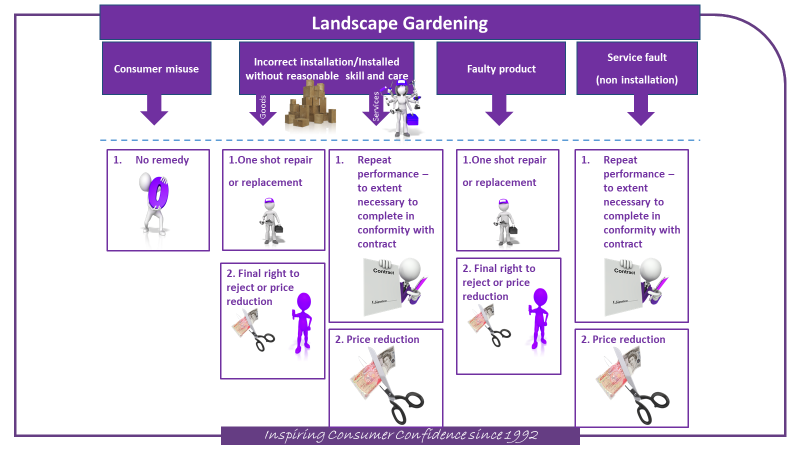Q: We have just carried out a landscaping project for a consumer which has not gone to plan, leaving us in a situation where we cannot even put it back to what it was. The consumer wants a full refund, but whilst we agree that the result is not what was contracted for, we don’t think it is as bad as the consumer is making out. What would be a reasonable resolution for the consumer in these circumstances?
A: It is not uncommon for garden make-over projects to contain aspects of supply of goods, provision of services and an amalgamation of both, overseen by a project manager. This can further be complicated if sub-contractors are used for different aspects of the work, for example, a specialist tree-surgeon might be required to assist with preparatory works, whilst an electrician might be needed to assist with finishing touches, such as lighting effects. Therefore, even without the unreliable nature of the British Summer, such projects are notoriously difficult.
Supply of Goods
A consumer’s rights in relation to goods are fairly straight forwards where goods are supplied in isolation, but this will rarely be the case. That said, a free-standing bench which does not conform to contract would be subject to a short-term right to reject enabling the consumer to seek a full refund.
Following expiry of that 30-day period, a consumer may be entitled to either a repair or replacement. The trader has one opportunity to carry this out and if the matter is still not resolved, the consumer may be entitled to full or partial refund or a price reduction.
Supply of Services
In relation to services, where these are not carried out with reasonable care and skill within a reasonable time, the consumer is entitled to repeat performance at no extra cost. This must also be carried out within a reasonable time and without significant inconvenience to a consumer, failing which the consumer may be entitled to a price reduction which could be up to 100%.
Good & Services
But what about the issue in this scenario, where the trader has carried out a design, lifted lawns, moved earth and removed trees (service); supplied plants, or products such as weed control and furniture (goods), built a summer house (an amalgamation of goods and services) and in doing so has quite literally changed the landscape, so that to put the consumer back in the position before the work began would be very difficult to so.
If goods are installed incorrectly, the consumer can treat this as a breach of requirement for services as well as for goods and can therefore choose to use EITHER the services remedies OR the goods remedies (save as to short term right to reject which is not available where breach of requirements for goods is only that they have been installed incorrectly).
This can be shown using the flow-chart below:

Our Advice
Legal Remedies:
Our advice to the trader in the scenario above would be to put forward a plan to the consumer to complete the works in accordance with the original specification. Legally this is called repeat performance. If this is not possible, there is another legal option, being a price reduction which could be up to 100%, but in the scenario above, we would seek some quantification as to the value of the works carried out to date, in order to calculate a reasonable deduction.
Practical Remedies:
If something has arisen which makes the works as originally specified, impossible, whilst the price reduction would be the legal remedy, the trader could work with the consumer to agree a contract variation which would enable the works to be completed, with whatever amendments are required to complete the job to a professional standard. Any such variations should…
- Be in writing
- Give the consumer the option to walk away
- Ensure any price reduction is reflective of the revised specification.
Other Considerations:
At the outset of any project having the right paperwork at the right time, is not only a legal requirement, but can also reduce complaints and aftercare issues. A check-list to ensure best practice etiquette and to evidence sign-offs can also be useful to have in advance of the project commencement.
Remember, if you as trader engages a sub-contractor, you are responsible for their work being completed with reasonable care and skill and for any remedy arising if they are not.
In any large project, if is always advisable to consider the what ifs and deal with these up front:
- What if the weather is such that we cannot get onsite?
- What if the parking at the property is not sufficient for us to get access for our machinery?
- What if the consumer has not thought about their obligations, for example to check for any tree preservation order or obtain any planning permissions?
At the Ombudsman, we will always look at the facts of the claim and the evidence presented by the parties to determine what is reasonable in the circumstances. We offer training to traders to help our members get it right first time for their consumers and our insight from the cases that we investigate, provides invaluable advice to traders who are committed to best practice and inspiring consumer confidence.
